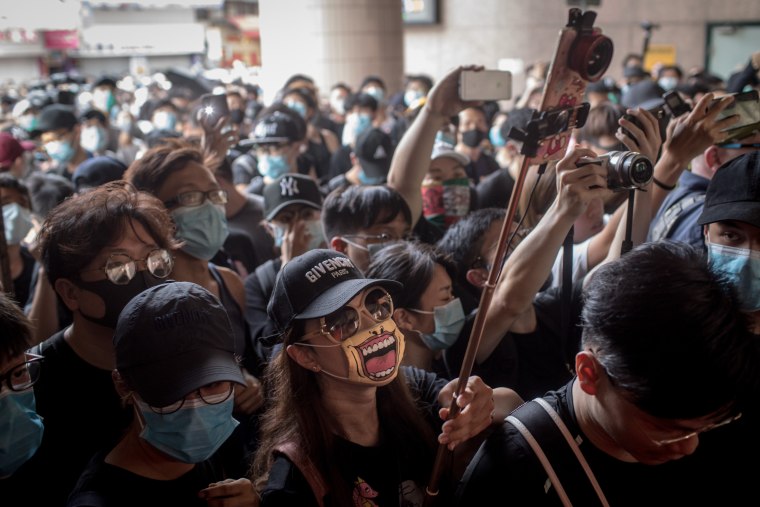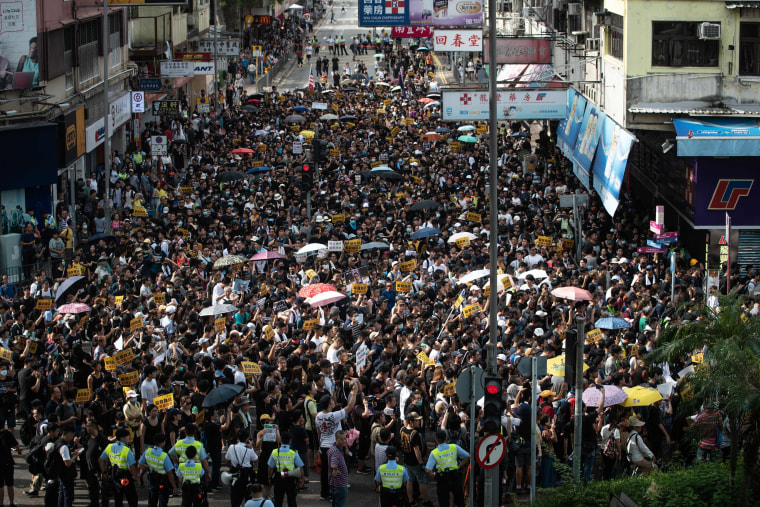SHEUNG SHUI, Hong Kong — A protest movement that began in the heart of Hong Kong edged closer to the mainland Saturday as activists opposed to China's influence over the territory took their fight to the border.
Thousands of people took to the streets of the Hong Kong territorial town of Sheung Shui, not far from the Chinese city of Shenzhen.
The march was aimed at mainland Chinese traders who locals claim have fueled inflation, driven up property prices, dodged taxes and diluted the town's identity.
It started peacefully but devolved into scuffles and shouting. Protesters threw umbrellas and hardhats at police, who retaliated by swinging batons and firing pepper spray.
Mass demonstrations began weeks ago in opposition to a proposed extradition bill that would allow for suspects to be sent to the mainland to face trial, but have since expanded into a broader repudiation of Beijing's growing influence.
Although Hong Kong's chief executive Carrie Lam seemingly backed down on the bill — first postponing it indefinitely and then pronouncing it "dead" earlier this week — protesters have continued to organize.
"I hope for the people overseas to know that Hong Kong is seeking democracy," protest organizer Ronald Leung, 42, told NBC News.
Leung said the initial movement has inspired smaller communities to voice an array of concerns.
"We can see a lot of mainland Chinese coming in, and our government is taking their side, and it’s making people in Hong Kong not happy," said Leung.
"I feel it is almost like the Chinese government are sending people on purpose to disrupt our community," he added.

Sheung Shui is frequented by Chinese visitors because of its proximity to the mainland.
Residents of the town claim it's resulting in an influx of "grey market" pharmacies that are selling knock-off medicines from the mainland that are unregulated and potentially fake.
These pharmacies are also driving up the cost of rent in the district, forcing other businesses to close, protesters said.
Local residents also take issue with the conduct of Chinese visitors, claiming they have contributed to a lack of cleanliness in the area with more litter.
Saturday's march was largely peaceful, though tensions rose when police blocked demonstrators from reaching a train station in Sheung Shui.
One man among the protesters shouted, "Return to China," while marching through the town's streets — a sentiment which was met with cheers.
Another older woman waved a British flag in defiance of the current political leadership.
Alexandra Wong, 63, said she was trying to remind older residents of the territory’s past and encourage them to join the protests.
“The Englishmen set up democracy, free power, independence for us,” she said. “Right now, everything is out of order.”
The former British colony became a special administrative region of China in 1997.
Unlike those living in mainland, the territory's seven million residents can freely surf the internet and participate in public protests.
But many have expressed fear that their rights are being eroded under Beijing's rule. At its peak, the demonstrations have seen as many as 2 million people march the street of Hong Kong.
Tensions reached their high point recently when protesters smashed their way into Hong Kong's Legislative Council building, eventually being forced back by police firing teargas.
The political crisis has also reverberated overseas.
China's ambassador to London Liu Xiaoming accused Britain of meddling in its affairs by continuing to act as Hong Kong's colonial master.
The crisis in Hong Kong shows no signs of relenting either.
Samantha Topp reported from Hong Kong and Linda Givetash reported from London.



